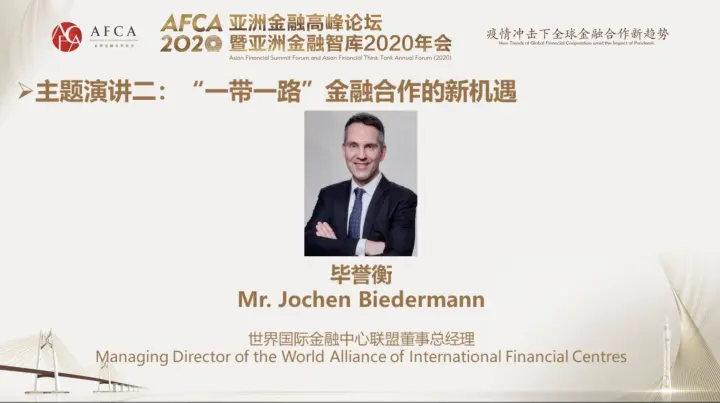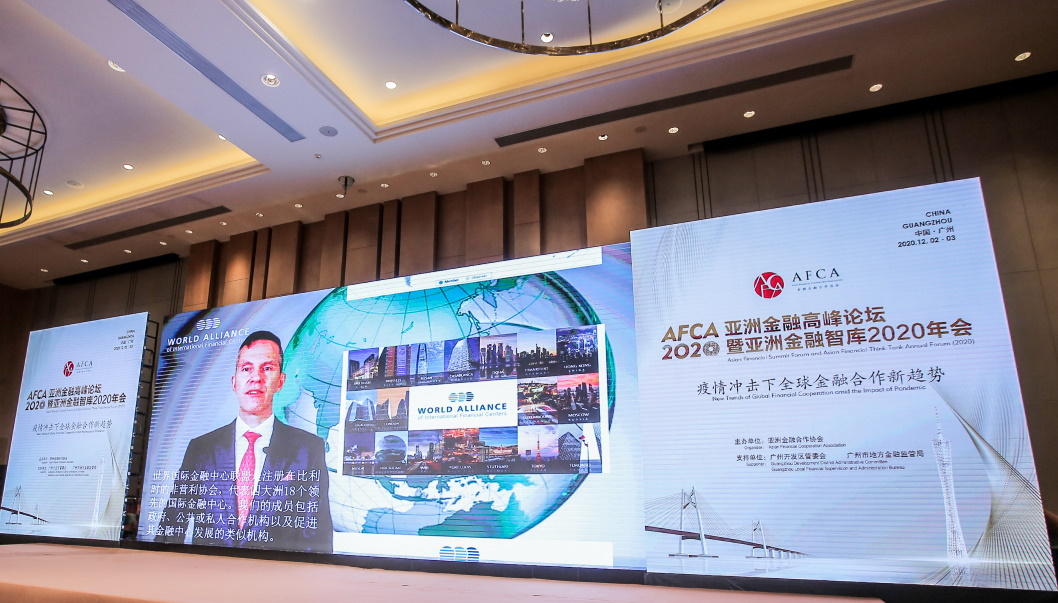
Präsentation auf dem Asian Financial Summit Forum
Dr. Jochen Biedermann sprach auf dem Asian Financial Summit Forum
and Asian Financial Think Tank Annual Forum, auf Einladung der Asian Financial Cooperation Association (AFCA). Er ist ein Mitglied des AFCA Think Tanks.

Die AFCA ist eine regionale Nichtregierungs- und Non-Profit-Organisation, die beim chinesischen Ministerium für zivile Angelegenheiten registriert ist und Finanzinstitute, Verbände der Finanzindustrie, relevante professionelle Dienstleistungsagenturen und Experten des Finanzsektors aus asiatischen Ländern und Regionen auf freiwilliger Basis umfasst.
In seiner Rede stellte Jochen Biedermann die Arbeit des WAIFC im Allgemeinen und die Vorbereitung der wirtschaftlichen Erholung von der Pandemie im Besonderen vor. Er betonte die Bedeutung der Zusammenarbeit zwischen internationalen Finanzzentren entlang des Seidenstraßen-Wirtschaftsgürtels und der maritimen Seidenstraße. Abschließend erläuterte er einige Beispiele von WAIFC-Mitgliedern in Kasachstan, Korea und Deutschland.
Hier ist eine Aufzeichnung seines Vortrags (auf Englisch und Chinesisch):
Transcript:
Dear Members and Guests of the Asian Financial Cooperation Association,
First of all, I would like to convey the best regards from the World Alliance of International Financial Centers. Unfortunately, I cannot be with you in Guangzhou today, which is a pity. I was very much looking forward to joining this event in person, but COVID19 changed my schedule, as it changed many plans this year.
Let me start my speech by introducing the World Alliance of International Financial Centers, a relatively new organization, founded in 2018.
I will explain later why our activities are relevant also in the context of Belt and Road Financial Cooperation.
The World Alliance is a non-profit association registered in Belgium, representing 18 leading international financial centers of four continents. Our members are city governments, public-private partnerships, and similar institutions developing and promoting their financial centers. We organize the collaboration between leading financial centers worldwide.
We run projects together for topics like FinTech and Sustainable Finance. We exchange best practices between our members, and we jointly promote the vital role of financial centers in financing the economy.
Our membership represents 17 countries with a total nominal GDP of 22 trillion US-Dollars, 3.400 banks, 12.000 FinTechs, and more than 60.000 investment firms, as of 2019.
This year, at the World Alliance, we have a strong focus on the Economic Recovery from the Pandemic, as many other institutions. In a report published in April, we looked at how global financial centers can help combat the COVID-19 Pandemic. We discussed our members' previous experience, for instance, from SARS in 2003 and the Tohoku earthquake of 2011.
In our Joint Declaration in May, we have clearly stated what we stand for during this global health crisis:
- International cooperation,
- sustainable investments, and
- avoiding protectionism.
As leading financial centers, we stand together. We are convinced that we can play a vital role in getting the world's economy back on track.
After our declaration, we have started four workstreams for addressing some of the most critical areas:
- Financing of small and medium-sized enterprises, which are the backbone of our economies,
- Sustainable Finance,
- Regulation, and
- Innovation & FinTech.
We have analyzed the current problems and developed new proposals to support the economic recovery.
Let me start with the regulatory issues. I want to highlight three areas:
First, Regulatory Cooperation. Following COVID-19, the reach and range of financial market interventions worldwide has expanded rapidly, in an uncoordinated fashion.
Many World Alliance member-countries moved quickly to adopt new regulations and measures to support businesses through the crisis. They were right to act to stabilize their economies. However, as countries emerge from COVID-19, there is a risk that some countries will react to others' crisis response measures differently. Post-COVID19, we need to strengthen processes around regulatory cooperation.
For SMEs, we need to improve their access to funding through capital markets and other sources. Furthermore, we recommend digitalizing trade and trade finance processes to help SMEs access global markets.
Last but not least, we discuss Banking Regulation.
The key priority now is for regulators and the industry to engage in continuous analysis of the lessons learned from the crisis and consider targeted regulatory adjustments where needed.
Next is Sustainable Finance.
The good news is that the Pandemic has not significantly affected sustainable finance's upturn. We believe that sustainable finance provides the building blocks for a post-pandemic global recovery.
So, what are the challenges and opportunities of a sustainability-focused
recovery for the financial industry?
First, as an immediate response, we need to embed sustainability objectives in financing the recovery. Furthermore, we recommend building new economic models, based on sustainability objectives. Third, we need to promote long-term perspectives – with large-scale asset owners and across the broader ecosystem.
Additionally, we need to encourage technological and social innovation further. Finally, we recommend focusing even more on carbon finance, for combating climate change.
Innovation is vital for the finance industry, whether it happens at incumbents, FinTechs, or TechFins.
We need to protect this innovative power during the current Pandemic, starting by expanding funding opportunities for start-ups. We recommend focusing on digital financial inclusion and developing digital financial literacy skills in the broader population.
Sound regulation is crucial. We need to find the right balance between supporting innovation on the one hand and protecting investors on the other hand. Cybersecurity is vital as well - for all players in the financial industry.
Digital identity solutions are key enablers for digital financial services, and they need to work across the borders. We promote collaboration between banks and FinTechs, in an Open Banking framework, for instance. Last but not least, we need to build global partnerships for linking the different FinTech ecosystems of our members.
Looking at the Belt and Road Initiative, by land and sea, there is a significant overlap with our membership. Seventeen of our 18 members are on the Silk Road Economic Belt, or the Maritime Silk Road, or close to them.
Therefore, our members and their financial clusters are key partners for implementing financial cooperation policies.
Please allow me to mention the new Astana International Financial Center in Nur-Sultan, Kazakhstan, as an example. It has become a vital financial hub for Central Asia and is ready to support the further development of the Silk Road Economic Belt.
China and its institutions have played a key role in setting it up. Shanghai Stock Exchange is a major shareholder of the Astana International Exchange, for instance.
On the other hand, and as I am a member of AIFC’s FinTech Advisory Board, I can tell you that FinTechs from Kazakhstan have a strong interest in the Chinese market. Supporting them with fast-track registration and licensing procedures could help Kazakhstan in building up financial innovation.
Potential topics for closer financial cooperation along the Belt and Road are FinTech, Sustainable Finance, SME Finance, and Regulation, for instance.
I have already addressed many recommendations that we should also discuss between financial centers along the Belt and Road.
Among them, addressing carbon finance by linking our emission trading systems is a clear priority in my opinion. China has already spent significant efforts in this area over the last three years.
I have not mentioned yet central bank digital currencies, which are a hot topic – not only in China but all over the world. A large majority of central banks worldwide are analyzing their usage or even have started to test them.
Depending on their exact design, they might provide the basis for a substantial boost in efficiency for global trade, based on smart contracts, for instance.
In the same way, we can use Blockchain or Distributed Ledger Technologies to automate trade and trade finance. Several international consortia are working on this, and we should support them by agreeing on global standards.
As an example, Busan International Financial Center, also a World Alliance member, has a strong interest in maritime finance and logistics, as one of the largest ports worldwide is located there.
Furthermore, Busan, Korea’s second-largest city, is the designated place for Blockchain developments. The Korean government and the city have started pilot programs for Blockchain-based container tracking and smart logistics, offering a number of opportunities for international cooperation in trade finance.
Last year, I advised one of the leading Korean banks on those opportunities, as this bank plays a central role in coordinating Blockchain-related activities in finance in Korea.
I hope you do not mind me briefly mentioning Germany at the end, being a citizen.
The German city of Duisburg is the terminal station for the cargo trains from China. About 60 trains leave Duisburg every week to many Chinese destinations, including Guangzhou, where this event takes place. Those trains are crucial for German SMEs in trading with their Chinese counterparts.
New technologies can help to improve logistics and trade finance here as well, bringing Europe and Asia even closer together.
Let me finally invite you to follow the activities of the World Alliance on our website or by subscribing to our monthly newsletter.
Thank you very much for listening to my speech. I wish you a pleasant forum.
